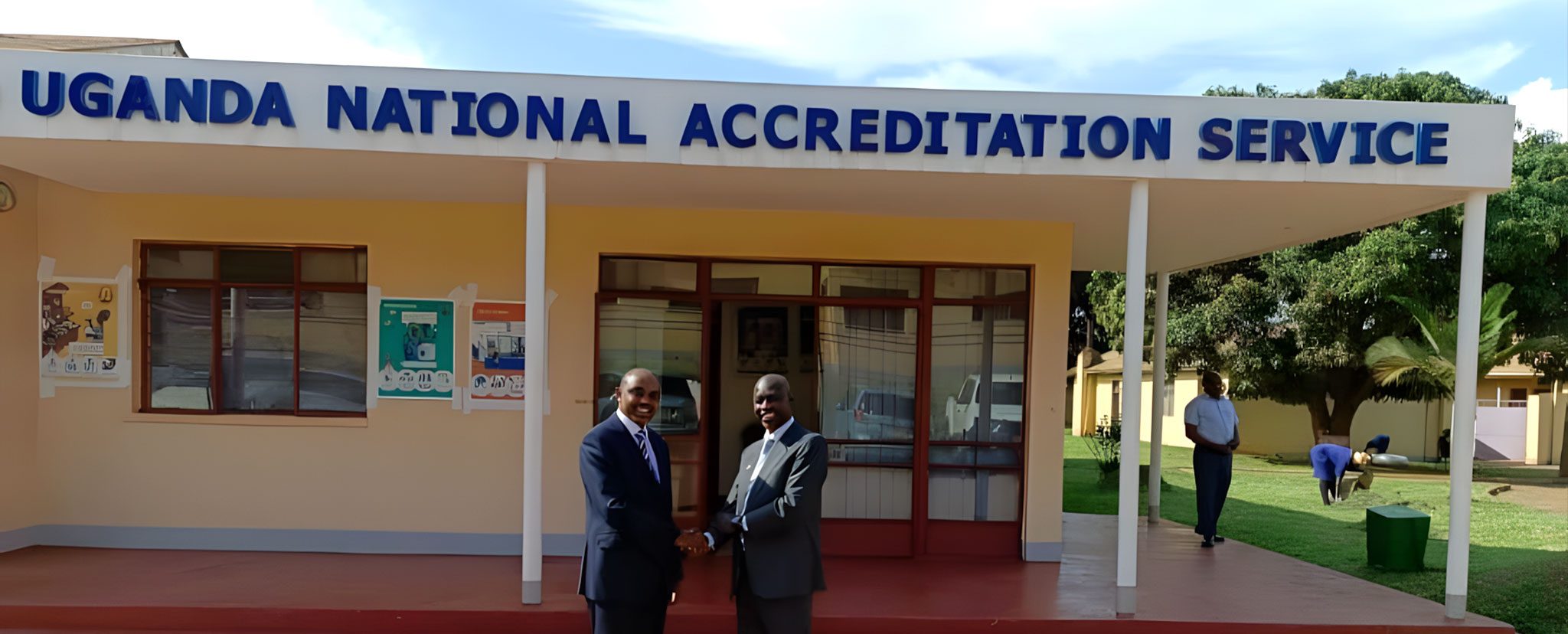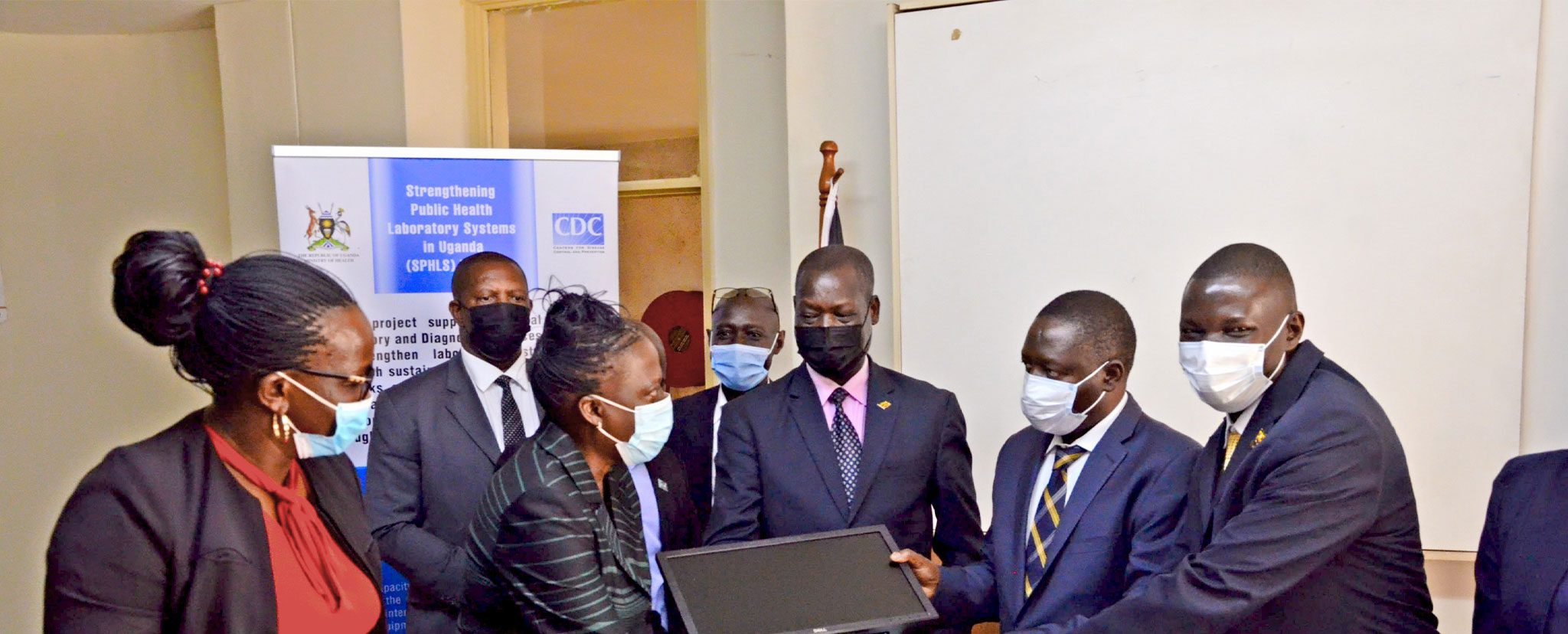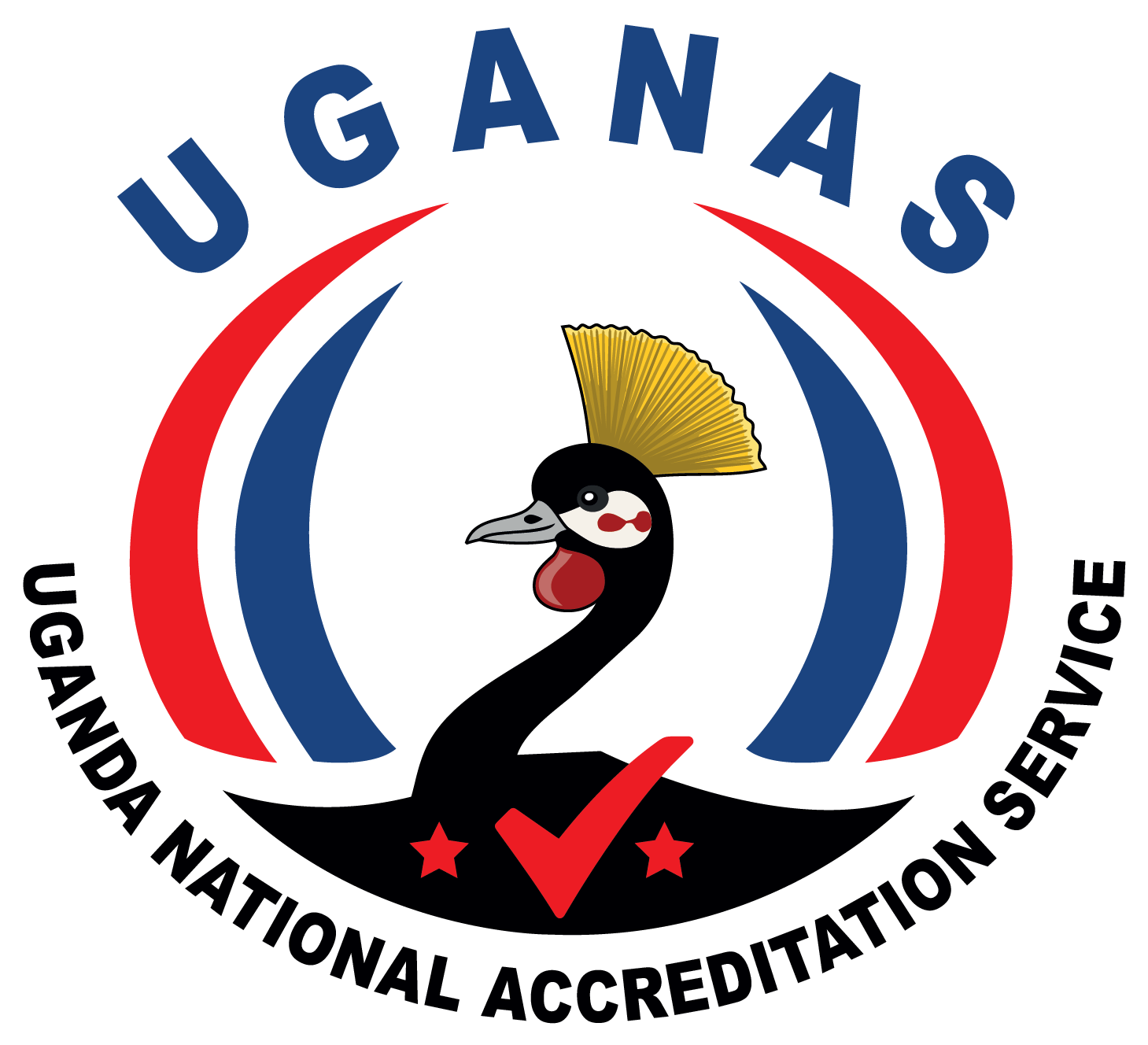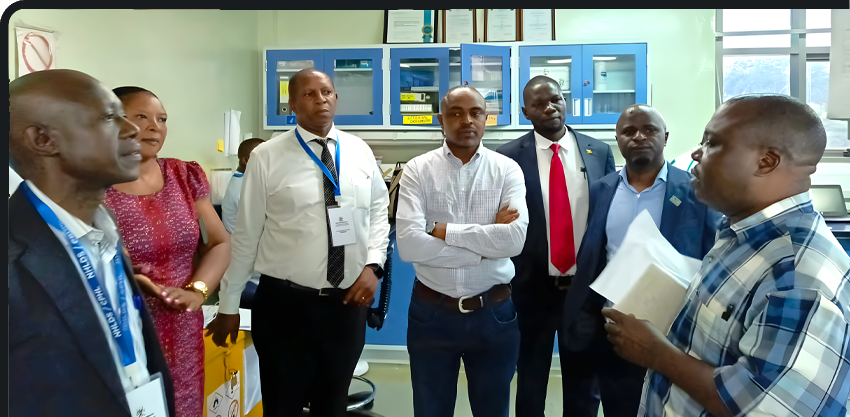UGANAS ACCREDITATION SERVICES (FAQs)
Below are some questions and answers that would help you understand what accreditation is and how to attain accreditation.
What is accreditation?
Accreditation is the endorsement by an authoritative body (such as UGANAS) of an organization’s competence, credibility, independence and integrity in carrying out its conformity assessment activities, such as testing, calibration, inspection, certification, proficiency testing, verification and validations.
Why get accredited: For CABs to provide services in a Competent, independent and reliable manner.
- It ensures international recognition of goods and services, hence is the “passport” for international trade based on multilateral agreements; - “Accredited once, accepted everywhere”
- supports harmonization of conformity assessment procedures globally
- is a requirement to operate in regulated areas, on the national and international level.
What is the difference between accreditation and certification?
Accreditation: Accreditation is the formal recognition by an accreditation authority of the technical and organisational competence of a conformity assessment body to carry out a specific service in accordance to the standards and technical regulations as described in their scope of accreditation.
Certification: Certification is the procedure by which a third-party body gives written assurance that a product, process, system or person conforms to specified requirements.
What are the benefits of being accredited?
These are some of the key benefits of being accredited.
Building Trust and confidence: In the global industry and trade, customers are becoming more demanding and seeking assurances on the products and services that you provide them. By getting accreditation, your customers will have the confidence in the quality of products and services that you provide. This will enable you to build trust and confidence between you and your customer.
International Recognition: Through the various mutual recognition arrangements between accreditation bodies in various economies and blocs, overseas markets will accept your company more readily if they know that you have been certified by an UGANAS - accredited certification body if you are a certification body or accept your test results/inspections if you are an accredited laboratory or inspection body.
Minimizes Risk: Accredited organisations reduce the risk of providing unreliable test results, services and products, and are able to meet the customers' expectations.
Reduce Costs of doing business: Although accreditation comes at a cost, the cost savings that result from being accredited will outweigh the cost of accreditation. Cost savings may result from improved productivity, reduced downtime, less/no re-testing, re-certification or re-inspection, hence saving cost for the business.
Demonstrate Credibility: No organization will want to spend money on getting a report or certificate that has not been accredited by a competent body. An SAC-accredited organisation is able to demonstrate competence for the report or certificate through its sound management system and the use of trained and competent personnel.
Benchmark for CABs’ recognition internally: Accredited CABs are posted on UGANAS website to market and promote recognition of their competence internationally.
Protection of health and safety of consumers and the environment. In general, public health and safety are advanced by accredited services in areas as diverse as diagnostic imaging, pathology labs, forensic testing, water quality and the management of the risks from asbestos in buildings as well as the protection of environment as Accreditation fosters a culture of quality and safety thus improves patient outcomes and mitigates risks.
What are the UGANAS accreditation schemes?
Currently UGANAS plans to operate the following accreditation schemes:
- Accreditation Scheme for Testing and Calibration Laboratories. This scheme evaluates the technical competence of testing and calibration laboratories based on the general requirements of ISO/IEC 17025 specific technical requirements of each field.
- Accreditation of Medical Testing and Diagnostic/ medical imaging Laboratories based on the international the standard ISO 15189.
- Accreditation Scheme for Inspection Bodies: This scheme evaluates the technical competence of inspection bodies based on the general requirements of ISO/IEC 17020 and specific technical requirements of each field.
- Accreditation Scheme for Management Systems Certification Bodies Quality Management System (QMS): This scheme evaluates the technical competence, integrity and independence of certification bodies providing ISO 9001 certification, based on the general requirements of ISO/IEC 17021 and IAF/AFRAC Mandatory Documents. The scheme also covers the certification of good distribution practice and use of medical devices
- Accreditation of product certification bodies base on ISO/IEC 17065
- Personnel Accreditation based on ISO/IEC 17024. This scheme aims to increase the industry’s confidence in personnel certification by providing third-party assurance of the competency and impartiality of accredited Personnel Certification Bodies. Personnel Certification Programmes will cover:
- Security Personnel
- Financial Planners
- Medical Technologies and Practioners
- Non-Destructive Testing Personnel
- Rope Access Personnel
- Welding Personnel
- Others
Other schemes of management system certification include:
Business Continuity Management System (BCM): This scheme evaluates the technical competence, integrity and independence of certification bodies providing ISO 22301 certification, based on the general requirements of ISO/IEC 17021
Energy Management System (ENMS): This scheme evaluates the technical competence, integrity and independence of certification bodies providing ISO 50001 certification, based on the general requirements of ISO.IEC 17021 and IAF/AFRAC mandatory requirements.
Environmental Management System (EMS): This scheme evaluates the technical competence, integrity and independence of certification bodies providing ISO 14001 certification, based on the general requirements of ISO/IEC 17021 and IAF Mandatory Documents.
Occupational Safety and Health Management System (OSHMS): This scheme evaluates the technical competence, integrity and independence of certification bodies providing SS 506 Part 1 and SS 506 Part 3 certification, based on the general requirements of ISO/IEC 17021 and applicable IAF/AFRAC Mandatory documents
HACCP based Food Management System: This scheme evaluates the technical competence, integrity and independence of certification bodies providing UGANAS HACCP certification, based on the general requirements of ISO/IEC 17021
Food Safety Management System: This scheme evaluates the technical competence, integrity and independence of certification bodies providing ISO 22000 certification, based on the general requirements of ISO/TS 22003 and CT 07 - SAC Criteria for Certification Bodies (FSMS).
Accreditation Scheme for Product Certification: This scheme evaluates the technical competence, integrity and independence of product certification bodies, based on the general requirements of ISO/IEC 17065 and IAF Guidance.
What is the general proc for getting accreditation?
The general procedure to obtain accreditation is as below (See process flow diagram in Figure 1 below)
Enquiry and Formal Application: Applicants will submit an application form to UGANAS with the necessary documents and a non-refundable application fee. An UGANAS Officer will contact the applicant and make the necessary arrangements
Preliminary Assessment (Optional): An assessor from UGANAS will conduct a preliminary assessment to check if the applicant is ready to be accredited.
Initial Assessment: A team consisting of UGANAS assessor and/or technical experts will conduct the initial assessment.
Recommendation by Assessment Team: The team will make a recommendation to the Accreditation Approval Committee for accreditation decision if the applicant has rectified any non-conformity satisfactorily.
Award of Accreditation: If the Accreditation Approval Committee is agreeable with the recommendation of the assessment team, they make a recommendation to the Director who then awards accreditation in accordance with the recommendations, for example the applicant will be granted accreditation and issued with a certificate of accreditation or the expansion scope of accreditation may be extended or reduced or suspended.
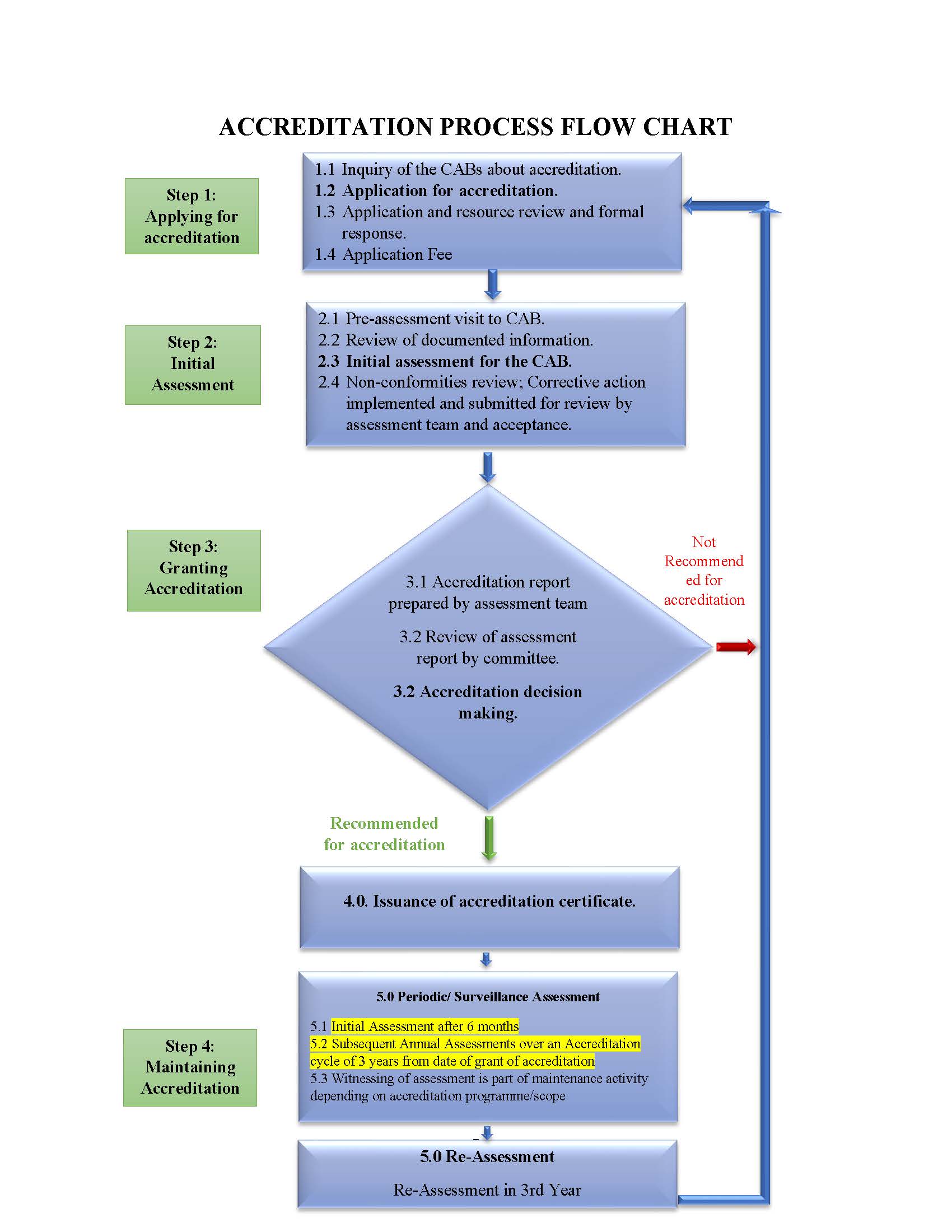
How long does it take to get UGANAS accreditation?
What happens after getting accredited?
What If you are accredited?
you will be able to use the UGANAS Accreditation symbol and offer your products or services with confidence both nationally and internationally. You can also make use of the ILAC or IAF MRA mark when UGANAS attains ILAC/IAF Mutual Recognition Arrangement. In addition, your company and the scope of accreditation will be listed in the UGANAS Directory and website, where companies and regulators visit to source for reliable service providers.
There will also be periodic surveillance assessments annually to ensure your continued compliance with the scope of accreditation. The accreditation certificate will also require renewal (re-accreditation) periodically, every 4-year cycle.
Additional information on UGANAS services including policies, guidelines to CABS and Assessors and informational publication are posted to the website: www.uganas.go.ug or make direct contact through email: [email protected]


